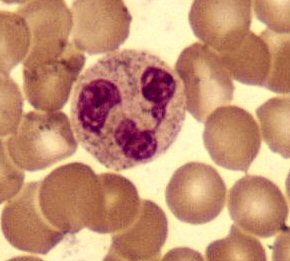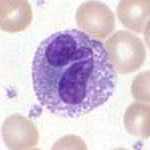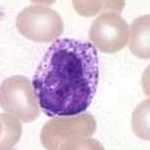Granulocyte facts for kids

Granulocytes are a special type of white blood cell. They get their name because they have tiny, colorful dots inside them called granules. These granules are like little storage bags filled with chemicals that help the cell do its job.
Granulocytes are also sometimes called polymorphonuclear leukocytes. This long name just means their nucleus (the control center of the cell) has a unique, segmented shape, almost like it's made of several connected parts. The most common type of granulocyte is the neutrophil.
These important cells are made in your bone marrow. They help protect your body from germs and infections. They do this by "eating" harmful invaders, a process called phagocytosis.
Types of Granulocytes
There are three main types of granulocytes. Scientists can tell them apart by how they look under a microscope when stained with a special dye called Wright's stain:
- Neutrophil granulocytes
- Eosinophil granulocytes
- Basophil granulocytes
Each type is named after how its granules react to the stain. For example, neutrophils have granules that don't pick up much color from the stain, so they look neutral. This is why they are called "neutro-phils."
Other types of white blood cells that are not granulocytes include lymphocytes and monocytes.
Related pages
- Agranulocytosis (a condition where you don't have enough white blood cells)
See also
 In Spanish: Granulocito para niños
In Spanish: Granulocito para niños
 | Dorothy Vaughan |
 | Charles Henry Turner |
 | Hildrus Poindexter |
 | Henry Cecil McBay |



